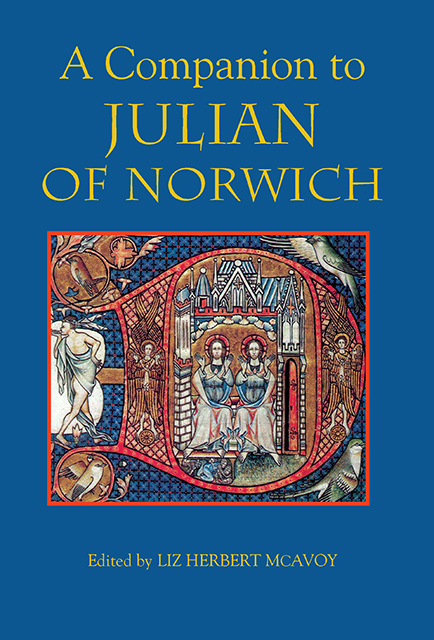16 - Julian's Afterlives
Published online by Cambridge University Press: 10 March 2023
Summary
Julian of Norwich has never been completely forgotten. Alexandra Barratt’s textual history of A Revelation shows that:
Julian's texts have had a more robustly continuous life than those of any other Middle English mystic. Their history – in manuscript and print, in editions more or less approximating Middle English and in translations more or less approaching Modern English – is virtually unbroken since the fifteenth century.
Academic interest in her has increased rapidly since the mid twentieth century, and she is now a fixture in the academic canons of the Middle English mystics, of medieval women writers and of vernacular theologians. However, and almost alone amongst such figures, she has a present-day public profile beyond the academy of professional medievalists and theologians. Julian, in fact, currently enjoys what medievalists will recognise as a cult. Like a medieval cult, it adapts and supplements its core materials, in this case A Revelation, in order to construct a figure who can address changing circumstances. Julian has a cult centre at the reconstructed cell in St Julian's Church, Norwich; she is the patron of the monastic Order of Julian of Norwich, based in Wisconsin; she is iconographically identifiable as a wimpled figure with a cat or hazelnut. Devotional objects and souvenirs, the modern-day equivalents of pilgrim badges, can be bought in worship centres, Christian bookshops and, increasingly, online. The word is spread by a proliferation of texts: as well as numerous editions, translations, abbreviations and selections of the Revelation, there are devotional commentaries, meditations and plays. Her words have been set to music and inserted into liturgies. Beyond committed Christian circles, she is known as a minor tourist attraction in her home town of Norwich, and via her presence, sometimes in disguise, in novels, poems and at least one film. Though almost all accounts of Julian are constructed from the basic elements of her texts, her anchoritism and something of the late medieval urban environment, the emphases vary, producing, amongst others, feminist Julians, conservative Julians and eco-Julians.
Most are grounded, however, in a consensual selection of the major points of interest in Julian's writing. Almost all depictions cite her envisioning of all creation in a ‘little thing the quantity of an heselnot, lying in the palme of my hand’ (Vision, 5.7–8), and her assertion that ‘Jhesu Crist, that doth good against evil, is oure very moder’ (Revelation, 59.7).
- Type
- Chapter
- Information
- A Companion to Julian of Norwich , pp. 208 - 218Publisher: Boydell & BrewerPrint publication year: 2008
- 4
- Cited by

